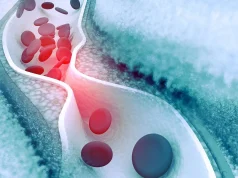Higher rates seen for hyperlipidemia, diabetes, coronary artery disease, cardiovascular mortality
WEDNESDAY, Aug. 1, 2018 (HealthDay News) — Ritonavir-boosted protease inhibitor (PI) therapy is associated with worse outcomes, including death, in patients with HIV and heart failure, according to a study published in the July 31 issue of the Journal of the American College of Cardiology.
Raza M. Alvi, M.D., from Massachusetts General Hospital in Boston, and colleagues compared characteristics, cardiac structure, and outcomes in 394 persons with HIV and heart failure who were receiving PI (145 patients) versus non-PI (NPI; 249 patients) therapy. PI-based antiretroviral therapy contained boosted-dose ritonavir.
The researchers found that patients who were receiving a PI had higher rates of hyperlipidemia, diabetes mellitus, and coronary artery disease (CAD); higher pulmonary artery systolic pressure (PASP); and lower left ventricular ejection fraction. Over the follow-up period, PI use was associated with increased cardiovascular mortality and 30-day heart failure readmission for all heart failure types. Cardiovascular mortality was predicted by PI use, CAD, PASP, and immunosuppression. Overall, PIs were associated with a two-fold increased risk of cardiovascular mortality.
“Further research is needed to determine whether PI-based regimens, either individual regimens or as a class effect, contribute pathophysiologically to processes leading to worse outcomes in heart failure (e.g., myocardial fat and fibrosis) and whether these findings can be replicated in prospective cohorts,” the authors write.
Copyright © 2018 HealthDay. All rights reserved.








